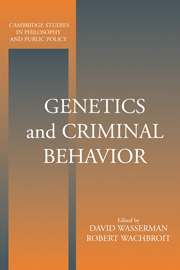Book contents
- Frontmatter
- Contents
- List of Contributors
- Acknowledgments
- 1 Introduction: Methods, Meanings, and Morals
- PART I
- PART II
- 8 Crime, Genes, and Responsibility
- 9 Genes, Statistics, and Desert
- 10 Genes, Electrotransmitters, and Free Will
- 11 Moral Responsibility without Free Will
- 12 Strong Genetic Influence and the New “Optimism”
- 13 Genetic Predispositions to Violent and Antisocial Behavior: Responsibility, Character, and Identity
- Index
12 - Strong Genetic Influence and the New “Optimism”
Published online by Cambridge University Press: 05 June 2012
- Frontmatter
- Contents
- List of Contributors
- Acknowledgments
- 1 Introduction: Methods, Meanings, and Morals
- PART I
- PART II
- 8 Crime, Genes, and Responsibility
- 9 Genes, Statistics, and Desert
- 10 Genes, Electrotransmitters, and Free Will
- 11 Moral Responsibility without Free Will
- 12 Strong Genetic Influence and the New “Optimism”
- 13 Genetic Predispositions to Violent and Antisocial Behavior: Responsibility, Character, and Identity
- Index
Summary
In “Freedom and Resentment,” now regarded as a classic of twentiethcentury philosophical analysis, Peter Strawson distinguished two schools of thought on the implications of universal determinism. Pessimists thought its truth would deprive the concepts of moral obligation and responsibility of “application” and imply that “the practices of punishing and blaming, of expressing moral condemnation and approval, are really unjustified.” Optimists, in contrast, held that “these concepts and practices in no way lose their raison d'être if the thesis of determinism is true” (Strawson 1962). Strawson's choice of names is revealing. It seems to make little sense unless we assume not only the value of our familiar practices and discourse of moral responsibility but also the eventual intellectual triumph of universal determinism. Given all that, the only interesting difference is between those who gloomily warn that determinism's inevitable triumph dooms the moral practices to senselessness (pessimists), and those who cheerily claim there is no tension between the truth of determinism and our practices of holding people morally responsible (optimists).
My own suspicion is that the sort of optimism Strawson had in mind appears to make sense only against the background of midcentury philosophical belief in the autonomy of ethics, the logical gap between facts and values, a sharp distinction between theory and practice, and the concomitant contemporary tendency to relegate morality to the realm of emotions, directives, choices, preferences, and deeds in a way that was thought to insulate it from being undermined by progress in scientific knowledge.
- Type
- Chapter
- Information
- Genetics and Criminal Behavior , pp. 273 - 302Publisher: Cambridge University PressPrint publication year: 2001
- 2
- Cited by

